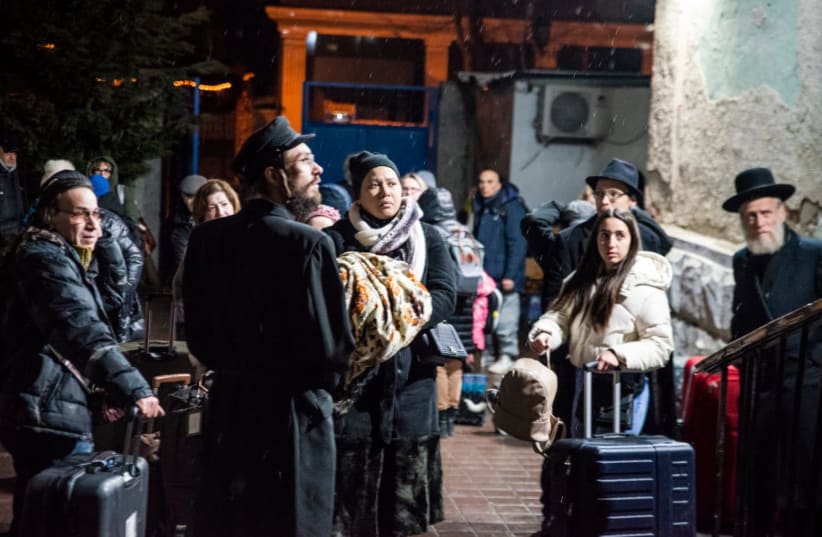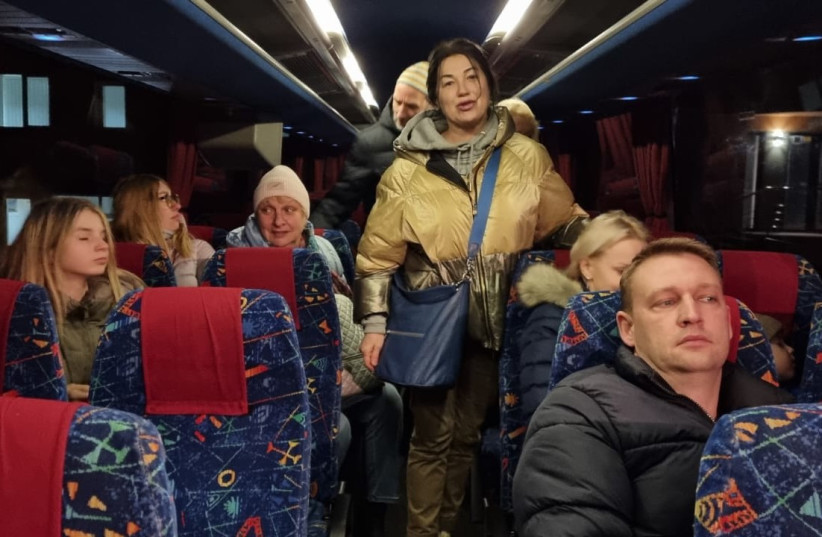WARSAW – The crisis in the region of the FSU countries, especially Ukraine and Russia, may have dramatic effects on the size and types of Jewish communities in Europe as we knew it at the beginning of 2022: not only are Ukrainians fleeing for their lives, but also Russian Jews who are afraid of a modern-day “Iron Curtain” that was in effect till 1991.
I spoke to many Russian Jewish leaders in the past week, in face-to-face conversations in neighboring countries since it is too dangerous for them to speak about these sensitive topics through regular communications systems. Many of them are sure they are being followed and tapped, frightened and fearful for the lives of their families and friends.
“Ninety percent of the young Jews in our communities are either out of Russia or want to leave,” said one of the Russian Jewish community leaders this week in Poland. “They see no future in Russia. It is sad since we’ve been building amazing infrastructure for the past 30 years – and now it may all be demolished.”
A senior Western European rabbi who has deep ties to the FSU communities said “The Ukraine Jewish community is done. Finished. The big question is: will the Russian Jewish community also fall apart? The way it’s looking now, there is a good chance that at least 100,000 Jews will leave – if not more.”
If you ask any demographer how many Jews live in Ukraine and in Russia, you’ll get different answers. According to Prof. Sergio Della-Pergola, the veteran Jewish world demographer, there are approximately 150,000 Jews in Russia, and 43,000 in Ukraine. These numbers are what Della-Pergola calls “core Jewish,” but if we check who is Jewish according to the Law of Return, there are about 200,000 Ukrainian Jews and about 400,000 Russian Jews.
Russian Jews on the ground repeatedly talk about how “their life has changed.” If you are a pensioner you can still buy some food in the supermarket, but there is a limit in some cities – between five and 10 items per person. Even basic foods or supplies are becoming an issue. Most stores are closed, and many supermarkets are running out of products from western world countries.
The worst issue, according to sources, is the lack of medication: literally within 24 hours, medication disappeared from the pharmacies because there are state controls of pricing. At the same time, the private market does not want to sell the medicine at its current value. Nowadays, you can obtain medicine in Russia only on the black market. These are major challenges.
Many people, especially in the Jewish community, talk of the need for psychological support. They have friends and family in Ukraine, and don’t understand why their president, Vladimir Putin, is attacking innocent civilians or even just invading Ukraine. They don’t get it – and they definitely don’t support it.
YOUNG PEOPLE who have been part of the middle class of Russia have been, in many cases, working for international companies – yet now everything is being cut off. “Most of the companies are leaving Russia, so we already have a very high level of unemployment rate in many Jewish communities,” said one of the Jewish leaders. “ And this is only the beginning.”
Another Russian Jewish leader said he was concerned “because our status in Russia can be under question. We try not to speak openly about these topics because our work in Russia is important for the Jewish people. And we would like to continue our work.”
The assumption is that everything is being monitored, including zoom calls and various online social media platforms, and thus communication with the outside world is complicated.
“Anything related to the current situation in Ukraine is absolutely not mentioned,” said a Jewish leader. “We want to ensure the safety of our community members on the ground. Today, anybody in Russia who says the word ‘war’ about Ukraine is in big trouble. This is basically a crime.”
The ruble crumbled. Products in supermarkets are mostly from the West. And that is why prices are in dollars. Prices are dramatically higher.
A source who is close to the Russian Jewish community said that there are many community members who have left for good to countries in the region or to Israel.
“Many have already fled to the communities around Russia: Armenia, Azerbaijan, Georgia, Estonia, Latvia and other countries. Yet so far, the ones leaving are people who have the means to immigrate immediately. If they have a visa to leave toward the European Union or other countries, they’ve probably done that already.”
Jewish community leaders acknowledge that the number of Russian Jews leaving the country is likely growing. There is already a major wave of Jews leaving Russia for Israel, with close to 2,000 doing so in the past three weeks.
“It seems now that the Jewish map of Europe, at least of Eastern Europe, will be changed very much in the next few years,” said a senior Jewish organization figure. “Many Jewish communities are eager to accept refugees in Europe and around the world. We’re living in historical times from the perspective of Jewish communities, and this period of enthusiasm and thirst for Jewishness, which started in the 1990s.”

